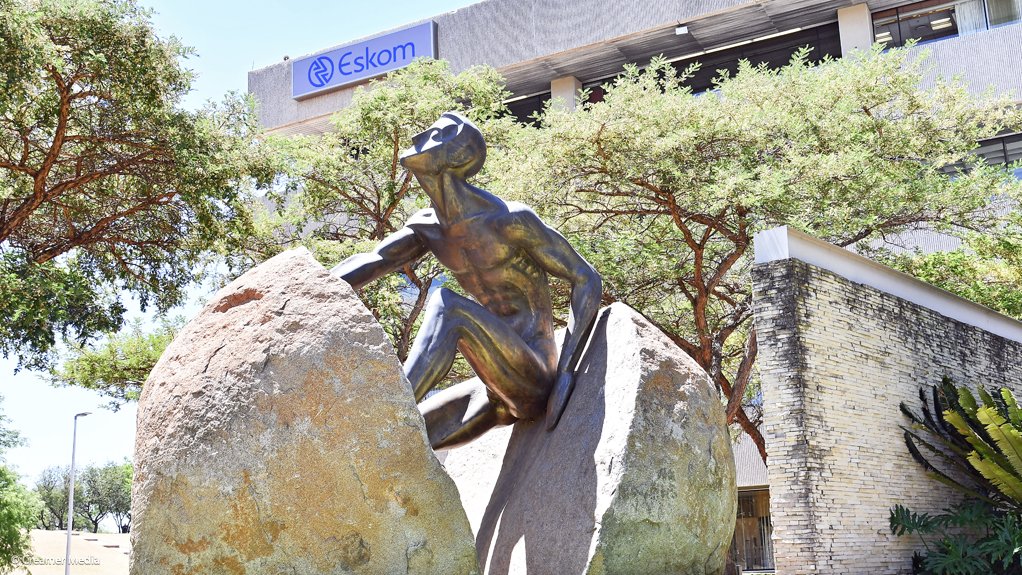Electricity utility Eskom has extended the deadline, to May 11, for responses to a request for proposals (RFP) to participate in its Short-Term Power Purchase Programme (STPPP), owing to the imposition of a 21-day lockdown in South Africa in response to the Covid-19 pandemic.
The initial bid submission deadline was April 30.
Through the STPPP Eskom intends contracting with those South African or regional entities able to supply short-term power, at an affordable rate, so as to reduce a supply gap that had developed as a result of poor production rates at its new coal-fired power stations, as well as its undermaintained coal fleet.
Prior to the pandemic, Eskom estimated that the shortfall could be as large as 5 000 MW for the coming 18 months as it began implementing so-called ‘philosophy maintenance’, whereby deviations from prescribed service and repair protocols and intervals would no longer be tolerated.
GM for risk and sustainability Andrew Etzinger tells Engineering News & Mining Weekly that Eskom is still analysing the potential impact that the pandemic, and the country’s response to it, could have on electricity demand once the lockdown ends.
Demand slumped by over 9 000 MW once the lockdown came into force at midnight on March 26, enabling Eskom to shut certain coal and nuclear units and ramp-up risk-based maintenance. The full implementation of philosophy maintenance was postponed, however.
Etzinger says the decision to reintroduce the STPPP scheme was made after Eskom was forced to declare State 6 load-shedding for the first time ever on December 9 and the RFP was released on March 23 after all governance approvals were secured.
The STPPP programme was halted in 2017 after a period of system stability and when it became apparent that the National Energy Regulator of South Africa (Nersa) would not allow Eskom to recover all the costs through the regulatory clearing account mechanism. Nersa disagreed with Eskom that all the STPPP costs had been prudently incurred.
Prior to its cancellation, the State-owned utility had been able to procure 825 MW of capacity under the STPPP, with much of the capacity secured from entities such as Sasol and the Kelvin power station.
Eskom also signed contracts with other industrial cogenerators, as well as with cross-border providers, such as Aggreko’s 107.5 MW interim gas-fired power plant in Ressano Garcia, Mozambique.
LESS POWER AVAILABLE
Etzinger does not anticipate that there will be as much spare capacity this time round and warns that Eskom is also not in a financial position to consider expensive solutions. For this reason power, barges and/or temporary power plants are unlikely to meet the utility’s affordability thresholds.
In spite of the cost-recovery risks, Eskom has nevertheless decided to revive the scheme again, owing to the prospect of a sustained supply deficit and it is, thus, aiming to secure about 150 MW under the STPPP mechanism.
Given the short term need for the energy, bidders are expected to demonstrate a scheduled commercial operation date of no later than December 31, 2020, and Eskom has specified a maximum contract period of 36 months. No power purchase agreement (PPA) can exceed the end date of December 31, 2023.
The utility will only contract with facilities that have capacities of greater than 5 MW and where that capacity is incremental – defined as existing unutilised capacity – as the objective is to procure additional capacity rather than to divert capacity.
Bidders may not aggregate separate facilities and all tariffs under the PPAs must be priced in South African rand.
Etzinger stresses that STPPP bidders are not precluded from submitting tenders into any other similar procurement process, including the bidding programme likely to be initiated by the Department of Mineral Resources and Energy (DMRE) for 2 000 MW of emergency power.
Last month, Nersa published consultation papers for two separate Ministerial determinations submitted by Mineral Resources and Energy Minister Gwede Mantashe for the regulator’s concurrence as required under Section 34 of the Electricity Regulation Act.
A deadline of April 14 was set for the receipt of written submissions for the first paper, which deals with the determination for technology solutions to close an immediate 2 000 MW gap identified in the Integrated Resource Plan 2019.
Nersa has indicated that it will not host hearings on the determination and that it will take three months, from March 18, to provide its concurrence.
Eskom will also not consider the additional capacity available from certain wind and solar farms, which have been contracted to supply a specified amount of electricity to Eskom in line with PPAs procured by the DMRE through various renewable-energy bid windows. A separate process is reportedly under way, led by the Independent Power Producer Office, to assess the prospect for procuring that additional capacity.
Besides availability, Etzinger tells Engineering News & Mining Weekly that the price of the electricity offered will be a major evaluation criteria, particularly in light of the fact that Nersa has previously disallowed full cost recovery.
The board would also make an assessment as to the outlook for demand before sanctioning the PPAs.
Once bids are received on May 11, Eskom will evaluate the offers and seek board approval to enter into negotiations with potential suppliers. Contracts are, thus, not likely to be signed until mid-June at the earliest.
EMAIL THIS ARTICLE SAVE THIS ARTICLE ARTICLE ENQUIRY
To subscribe email subscriptions@creamermedia.co.za or click here
To advertise email advertising@creamermedia.co.za or click here











